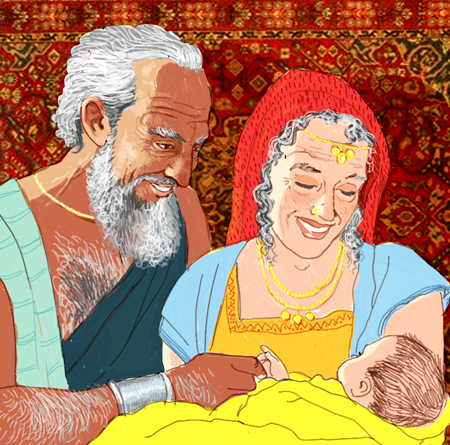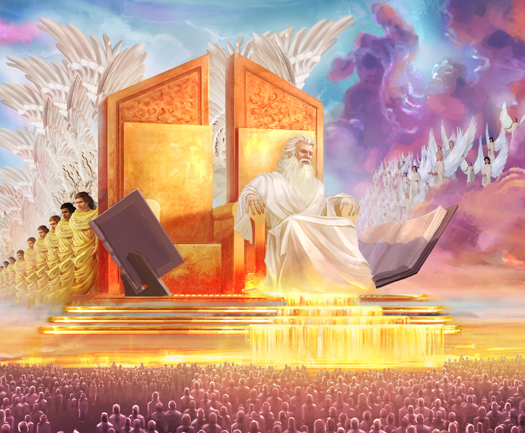In the videos I’ve done and in these posts, I’ve spoken of “the God of Abraham”. And some have questioned, “Why did you use that phrase? Why not just say God? Or Jehovah?”
 I guess, if you want to talk about a huge subject, you can talk about God. Or the name of God. I choose “the God of Abraham” because for probably the majority of people on earth, when you use that phrase, they know what you’re talking about.
I guess, if you want to talk about a huge subject, you can talk about God. Or the name of God. I choose “the God of Abraham” because for probably the majority of people on earth, when you use that phrase, they know what you’re talking about.
I could have said, “the God of the Bible”. But even that can arouse hesitations and possibly opposition. I wanted to find a phrase that would be clear to as many people as possible and with as little religious “baggage” as possible.
You might be surprised how many people trace their faith back to Abraham, a man who lived 4000 years ago, who has been called “the father of Faith”. I won’t get into the specifics of Abraham but he isn’t someone who nowadays inspires much hatred toward him or what he did with his life. In the first video I did, “An Introduction to Prophecy in History”, there is a part about Abraham and how so much of what billions believe today originated with him. And he even received specific, time-related prophecies, just as Daniel did some 1400 years later.

in Daniel 7: 9 & 10
To write about God is for me an awesome thing which I know is so full of controversy, unknowns and religious dogma that I don’t really do it very much. But it’s fascinating to look at the way God is portrayed, both in the Old Testament and the New Testament. In the Daniel 7 video there is one of the most unique visualizations of God in the whole Bible. There He is called “The Ancient of Days” (Daniel 7:9 & 10).
And this is bound to raise the hackles of some but the Koran is also based on faith in the God of Abraham. (I can hear the temperatures rising in some right now as you read this.) So just to give some backup to this thought, I could tell you about a book I’m currently reading by a man who is an executive director of Christianity Today magazine, Timothy George. His book, “Is The Father of Jesus The God of Muhammad?” is excellent, deeply researched and would shock a lot of people with what is said there.
But, back to God. James, “the Lord’s brother” (Galatians 1:19), called God “the father of lights” (James 1:17). The book of Hebrews refers to God as “the Father of spirits” (Hebrews 12:19). In the book of John, Jesus said “God is a spirit” (John 4:24) and John the Beloved said “God is light” and “God is love” (I John 1:5 and 4:8).
For me, frankly and honestly, God is almost too big to comprehend or understand. That’s why I feel closer to, and think more about, Jesus. Jesus has been here; He walked the earth, was one of us, suffered our temptations and felt our aspirations. Paul says, “There is one God, and one mediator between God and men, the man Christ Jesus.” (I Timothy 2:5)
But even that is loaded with controversy and, generally, the circle of people who believe in the God of Abraham throughout the world is larger than the circle of people who believe in Jesus. I personally had a 7 month period of time where I knew that God was real as He had radically intervened in my life and made Himself manifest in tangible, miraculous ways. I knew God was real. I also knew the devil was real as he also had manifested himself clearly to me and I wanted no part with him.
 So I feel a kindred spirit with the billions of people who believe in God, the God of Abraham, because I was like that for a while. At that time I read the Bible every day but I hardly got anything out of it. I was plowing through the Old Testament and it was clear as day to me that I needed to start some kind of animal sacrifice to please God since it was obvious that this was one of the main things. It was right there in the Bible, how could I argue with that? But all that time there was this big question, “Who was Jesus?”
So I feel a kindred spirit with the billions of people who believe in God, the God of Abraham, because I was like that for a while. At that time I read the Bible every day but I hardly got anything out of it. I was plowing through the Old Testament and it was clear as day to me that I needed to start some kind of animal sacrifice to please God since it was obvious that this was one of the main things. It was right there in the Bible, how could I argue with that? But all that time there was this big question, “Who was Jesus?”
 I went to some local churches to try to find the answer. But nobody talked to me and I guess I was shy or scared. After 7 months I met some young, non-conformist Christians, “Jesus freaks”, who were just getting started at the time. They showed me from the Bible who Jesus was, as well as the plan of salvation. I accepted Jesus as my Savior and received Him into my heart, being born again and starting on this wonderful life I’ve had. I think the biggest single change in accepting Jesus into my heart was that the Bible which had before been so unclear and opaque suddenly became clear and open, flooding my heart with truth, wisdom, knowledge and all I’d longed for.
I went to some local churches to try to find the answer. But nobody talked to me and I guess I was shy or scared. After 7 months I met some young, non-conformist Christians, “Jesus freaks”, who were just getting started at the time. They showed me from the Bible who Jesus was, as well as the plan of salvation. I accepted Jesus as my Savior and received Him into my heart, being born again and starting on this wonderful life I’ve had. I think the biggest single change in accepting Jesus into my heart was that the Bible which had before been so unclear and opaque suddenly became clear and open, flooding my heart with truth, wisdom, knowledge and all I’d longed for.
Becoming a Christian made my relationship with God vastly so much stronger and settled. But this has in no way made me feel antipathy for the countless number of folks worldwide who may not know Jesus, but who deeply believe in the God of Abraham. I can truly say that I often feel a real fondness for and empathy with them, no matter what their nationality, race or religion. Jesus said of one man, “You are not far from the Kingdom of God” (Mark 12:34). There must be literally billions of people throughout the earth who believe in the God of Abraham. Would to God that we could love each other more and see the good and faith in the Father that He must see in each of us who seek Him. As well, would to God that those of us who’ve come to know Jesus would share Him more with others.
‘The God of Abraham’ is a good term.
Exodus 20:2 puts it even more precisely: “I am the LORD thy God, which have brought thee out of the land of Egypt, out of the house of bondage.”
It is good to be specific, so we know who we are speaking of.
Jesus said:
(John 8:56-58) “Your father Abraham rejoiced to see my day: and he saw it, and was glad. Then said the Jews unto him, Thou art not yet fifty years old, and hast thou seen Abraham? Jesus said unto them, Verily, verily, I say unto you, Before Abraham was, I am.”
So if Jesus is the mediator between God and man, then the LORD who communicated with man throughout the Bible must be Jesus.
And thus Jesus is made more important than some would like it to be. He is the only way to God. (John 14:6) “Jesus saith unto him, I am the way, the truth, and the life: no man cometh unto the Father, but by me.”
Jesus also said: (John 13:20) “Verily, verily, I say unto you, He that receiveth whomsoever I send receiveth me; and he that receiveth me receiveth him that sent me.”
So whosoever receives him that He sends, receives the God of Abraham. And by the same token, whosoever does not receive whom Jesus sends, does not receive the God of Abraham, because Jesus IS the God of Abraham. God was made flesh… (John 1:1) “In the beginning was the Word, and the Word was with God, and the Word was God.”
Yep; I agree with you. As I mentioned in the article, there are a lot of folks around the world who deeply believe in the God of Abraham but may not have yet come to an understanding or acceptance of who Jesus is. Pope Gregory the Great, around 600 AD, at a time of tremendous missionary activity in Europe, counseled patience for those who were bringing people to faith in Jesus and famously talked about how it must be “by steps”. It certainly was that way with me.
‘Acceptance’ of who Jesus is, is probably the key word here. Many understand, or understand in part, but reject Him, i.e. reject the God of Abraham.
The only place where there is a full and complete acceptance of the nature of Jesus, is where the entire Bible forms the base. Jesus is there the cornerstone.
Hello again Mark. Looking over some of your articles I make some additional comments. Hope you don’t mind.
You wrote:
“I could have said, “the God of the Bible”. But even that can arouse hesitations and possibly opposition. I wanted to find a phrase that would be clear to as many people as possible and with as little religious “baggage” as possible.”
Comment: Why are you worried about arousing hesitations and opposition? And why are you afraid of using unambiguous language, with a Christian message or ‘baggage’? Because – after all – I assume what you want to preach is Jesus, not Mohammed. If you preach Jesus you will have opposition, so don’t worry about it.
As it is, it may seem you are trying to blend two religions, or syncretize?
You say: “…the Koran is also based on faith in the God of Abraham.”
And you go on to say that “to give some backup to this thought” and you cite the title of a book by Timothy George. Saying of the book: “His book…is excellent, deeply researched and would shock a lot of people with what is said there.”
You are obviously convinced, but that is not really an argument for anything. For those who may not have read his book, what are the arguments that Mohammed’s God is the father of Jesus, and that “the Koran is also based on faith in the God of Abraham”, i.e. the God of the Bible?
You could even put a brief synopsis of the book it into a separate article.
Hi Andrew. Let’s face it; most anyone can pick up on the array of barbs and innuendos in your first question there. My life has been spent as a missionary, trying to bring people to the knowledge and love of God and Jesus. The same way you would want to make it as easy as possible for a child you love to be able to eat and digest the food you give them, I aim to try to “feed His sheep” with wholesome, digestible food, free of unnecessary additives.
As for blending religions and syncretism, I guess it’s simply what Paul said, “To the Jew I became a Jew, that I might gain the Jew. I am become all things to all men that I by all means might win some.” (I Corinthians 9: 19-22) He didn’t mean winning religious disputes; he meant winning souls for Jesus.
About Timothy George’s book, “Is the Father of Jesus the God of Abraham”, I did put a link in the article to the book which is on Amazon.com. I assume that anyone who has further interest in pursuing that subject will follow the link.